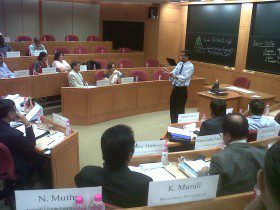The Harvard University South Asia Institute collaborated with the World Bank and the Government of India’s Department of Public Enterprise to organize a four-day Executive Development Program titled “Non-State Players in Human Development – Achieving India’s Goals” The workshop took place at the Harvard Business School Classroom (a replica of a Harvard University campus classroom) at the Taj Land End Hotel in Mumbai, India.
From February 3rd to February 6th, 2014, the workshop was conducted by Harvard Professors V. Kasturi ‘Kash’ Rangan, the Malcolm P. McNair Professor of Marketing at the Harvard Business School, Tarun Khanna, the Jorge Paulo Lemann Professor at the Harvard Business School and Director of the Harvard South Asia Institute, and Ashish Nanda, Robert Braucher Professor of Practice at Harvard Law School, currently serving as Director at IIM Ahmedabad, his alma mater. Assisting with the program was Shashank Shah, Post-Doctoral Fellow, Department of Management Studies. The 47 participants were mainly top-level managers and executives from the large and medium-sized Indian public sector corporations, and some private sector companies. In India, public sector units have a great potential to effect social change due to their size and reach.
In view of the legislation on Corporate Social Responsibility (CSR) in India, the main objective of the program was to strengthen the capacity of a cadre of senior managers of corporations. Through the case study approach, best practices and strategies in CSR development were highlighted. The workshop was modelled after the highly successful Strategic CSR executive education program developed at the Harvard Business School. It includes case study sessions, sharing of ideas, experience and opinions via discussion groups and opportunities to recap and reflect on the learning.
The 12 cases studied were from across the globe – examples of best practices, as in the case of Charles Veillon, S.A., a Swiss mail order and retail company, and the highly evolved business philosophy of India’s home grown Jain Irrigation Systems Limited, as well as cases showing instances of business failure and collapse due to the complete lack of social responsibility as demonstrated in Bolivia’s Cochabamba Water case and the case of India’s Kudremukh Iron Ore Company Ltd. Questions on personal ethics and leadership were brought to the fore through the Harvard classic – ‘Parable of the Sadhu.’
The best-of-Harvard faculty included Kash, Tarun and Ashish, who are all leaders in their field. They brought their brilliant, complementary and inimitable teaching styles to the table – testing, tweaking and cajoling the interest and enthusiasm of seasoned corporate bosses.
The main takeaway from the workshop was that a strategically planned and managed socially and environmentally responsible code of ethics by corporates, not only results in increased profits, but will also sustain the business in the long term. Such a code of ethics should be embedded in corporate policy and should be followed in letter and in spirit. Several suggestions to facilitate true CSR ensued.
Read a LiveMint interview with Tarun Khanna about corporate social responsibility here.
‘Harvard University conducts CSR programme for Indian PSU executives’ in Business Standard.



